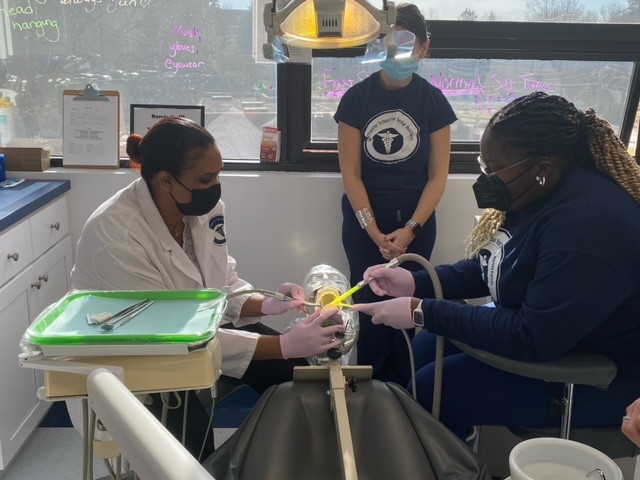
An In-Depth Guide to Becoming a Dental Assistant
An In-Depth Guide to Becoming a Dental Assistant
Taking a dental assistant course and becoming a dental assistant can get you started on a great career path. You’ll be entering a field that’s expected to experience significant growth in the years to come, giving you job security and a firm future. However, you might have some questions before fully committing to becoming a dental assistant, which is why the team from Westchester School for Dental Assistants has answered all of them here in our in-depth guide!
What Are the Requirements to Become a Dental Assistant?
Before you can begin working as a dental assistant, there are some important requirements you need to meet, the first being enrolling in an accredited training program. You’ll also need a high school diploma or equivalency to enroll in a dental assistant training program in New York. Often, completing a training program can take at least six months, and afterward, you may be required to take additional examinations or obtain other certificates.
To enroll in the dental assistant courses at Westchester School for Dental Assistants, you’ll also need:
- To be at least 17
- If applying with a foreign diploma, any additional credentials demonstrating you’ve completed the necessary education requirements (these may need to be translated)
- A valid ID with a photo (either a passport, driver’s license, etc.)
What Does Dental Assistant Training in NY Involve?
Although every school is different, there are some common topics that all dental assistant training courses cover. These include:
- Knowledge of Common Dental Equipment: To become a dental assistant, you’ll need to demonstrate you have knowledge of all of the equipment commonly used in a dentist’s office. This includes how to handle such equipment safely, clean and sanitize it, and dispose of hazardous materials and waste.
- Oral Anatomy: As a dental assistant, you’ll need to know the teeth, mouth, and facial structure like the back of your hand. This includes both normal and abnormal anatomy, in addition to learning about occlusion, mastication, and anesthesia.
- Communication: In a dentist’s office, communication is key, not only between staff members but with patients as well. That’s why you’ll need strong basic communication skills to be a successful dental assistant. Being compassionate and communicating in a way that makes patients feel comfortable is essential.
- Radiography Training: As a dental assistant, you’ll also need to be able to use radiography equipment. This involves properly positioning patients to receive x-rays in addition to taking them yourself. You’ll be required to determine the difference between a usable and unusable image as well.
What Type of Personal Skills Are Important for Dental Assistants?
As a dental assistant, you’ll be dealing with patients every day and in a busy dentist’s office, things can sometimes be stressful. That’s why having all of these personal skills at your disposal will help. Some of the most important are:
- Being Organized: Organization is key in any workplace, but especially in a dental office where you’ll need to file and keep track of important paperwork, organize materials and equipment, and keep tools sanitized and in their proper place for the next patient.
- Good Motor Control: Occasionally, dental assistants will be asked to help in procedures where they’ll be required to use tools and instruments. This means having good dexterity and hand-and-eye coordination is a plus.
- Great People Skills: Having strong interpersonal skills will benefit you greatly as a dental assistant. This is because some patients might feel anxious or be in pain during a dental procedure. Unfortunately, this can be directed toward the dental staff. That’s why having a cool head and the ability to stay calm and compassionate when such things occur is a necessity.
- Being a Good Listener: As a dental assistant, you’ll need to be able to listen and address the concerns of patients, in addition to carrying out the instructions you’re given each day by the team you work with.
- Being Detail-Oriented: When working in a dental office or an oral surgeon’s office, attention to detail is extremely important to maintain a safe and healthy atmosphere for everyone there. You’ll need to know how to sanitize to control the spread of infections, as well as all the duties you can, and can’t perform.
What Are Some of the Most Important Duties Performed by Dental Assistants?
On a daily basis, you’ll be expected to perform a variety of duties for patients and staff members alike. Not only will you be required to work with patients on payment and billing services, processing x-rays, working in tandem with the lab technician, and scheduling appointments, but a variety of other things as well.
On any given day you can expect to:
- Check patients in
- Escort patients to exam rooms
- Keep detailed records of patients and their procedures
- Hand dentists tools and instruments during dental procedures
- Record vital signs and take patient measurements
- Inform patients about oral hygiene and after-procedure care
- & More!
What Are the Conditions & Work Settings for Dental Assistants?
As mentioned above, there are a variety of locales that employ dental assistants. Most of these are in modern office settings, although some may be in government facilities such as veteran’s clinics, corrections facilities, and more.
Some of the most common settings are:
- Offices that create prosthodontics
- Periodontic offices
- Endodontic offices
- Oral surgery offices
- Offices for general dentistry
- Pediatric dental offices
To enroll in one of our dental assistant courses, contact us today!
If you want to learn more about our accredited dental school, contact us online today or call (914) 682-9001. We also offer EKG technician training and courses in phlebotomy!